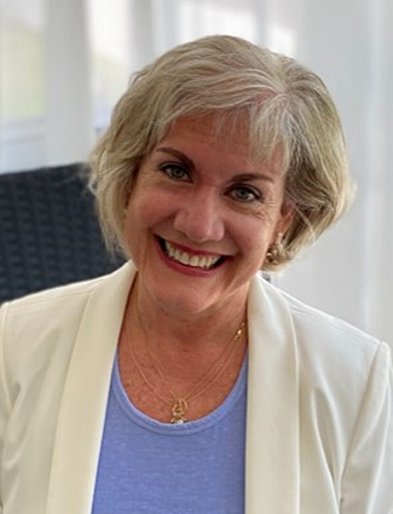Healing at Home: Sue Hoffmann

UF Health Shands HomeCare is a comprehensive home health and personal care agency devoted to helping patients maintain an independent lifestyle or continue therapy services from the comfort of their own home.
Speech pathologist Sue Hoffmann, MS, CCC-SLP, COS-C, CDP, provides speech and language services to patients. In this Q&A, she discusses the benefits of home care and challenges professionals in the industry may face, including the impact of the COVID-19 pandemic.
1. What kind of services do you provide at UF Health Shands HomeCare?
I provide speech and language services to our patients, but our team provides a full spectrum of care, including nursing, physical and occupational therapy, social work, home health aides and telehealth monitoring to our 12-county service area in North Central Florida.
2. What conditions or diseases can be helped by your specialty or the services you provide?
As a speech pathologist, I provide assessment and intervention to patients with head and neck cancer, tracheostomy, dysphagia, stroke/traumatic brain injury, movement disorders, dementia, dysarthria, voice problems, cognitive impairment, communication difficulties and augmentative communication needs. Our team also works extensively with the orthopedic and movement disorders clinics, ear, nose and throat, or ENT, and neurology to assist with postsurgical needs and recovery following discharge from the acute care setting.
3. What do you enjoy most about your work?
Our patients are wonderful! I really enjoy working with a culturally diverse caseload in the context of their home/community. I am very pragmatic, and this helps me truly understand what is important to the patient. You see a personal side of someone when you see them in their home, meet their family and see their lifestyle. This helps me better customize a plan to keep them safe and independent in the place they want to be — their home.
4. What are some of the challenges of your work and how do you overcome them?
Some of the greatest challenges stem from the health disparities I see on a regular basis. The lack of accessibility to care and services is disheartening at times. In addition to helping someone with skilled care, my colleagues and I have tried to assist rural patients obtain dental care, flooring for their home, groceries and improve their health literacy to increase their understanding of their disease or condition so they can better care for themselves and advocate for their needs.
5. Who can benefit from HomeCare?
Everyone! Many of our insurance payors require the patient to meet homebound criteria, and I used home care myself when I developed a severe infection following the birth of my first daughter. Rather than be readmitted to the hospital, the nurse came to my home to administer IV antibiotics so I could remain home with my newborn. We also work with patients with ongoing medical or therapy needs following discharge from an acute care setting, provide education on chronic conditions, diseases and medication, and work to prevent rehospitalization for people who are at high risk due to falls, multiple health problems or low literacy skills.
6. How does your work have an impact on the patients?
My patients could best answer this question, but my hope is that I’ve created moments of joy for them and their loved ones. Improvement in swallowing enables some to resume eating or rejoin their family during meals, even if their meal is modified in some way. Speech/voice/communication goals improve their safety, and their ability to obtain assistance or simply express their thoughts, wants and needs. It’s about quality of life, what is important to the patient and what is obtainable given their specific issues. Throughout the course of my career, patients have told me that I’ve changed their lives. That is honestly humbling to me, yet makes me grateful to have the skills and ability to help people improve tasks that make a difference in their lives.
7. How has the COVID-19 pandemic affected your patients and how you do your job?
As with most of the community, COVID-19 has caused isolation and an increase in baseline anxiety. Our patients have significant health issues to qualify for home care, and sometimes that event is life-altering. Symptoms from COVID-19 such as dyspnea, lethargy and shortness of breath compound difficulties that patients with speech, language or swallowing already have. My patients often rely on facial cues to understand speech and generate a response. Masks muffle speech and obscure gestures and facial expressions that enhance communication. It is also nearly impossible to work on swallowing while wearing a mask. However, a large part of our training as speech pathologists is to adapt our care to the needs of our patients. We’re always evaluating and modifying the task at hand. Although COVID-19 has created more opportunities to think outside the box, my care hasn’t really changed — I simply do so while wearing more PPE (personal protective equipment).